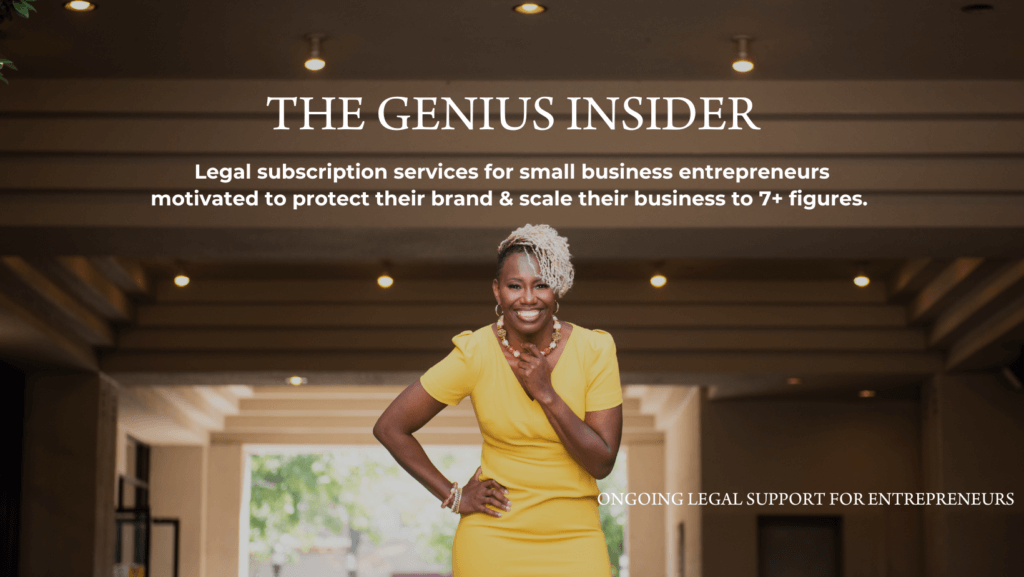In this episode, Attorney Murray discusses the history of copyright laws and how they relate to Disney. She highlights the cautionary tale of Katt Williams receiving a cease-and-desist letter for using the stage name ‘Katt in the Hat’.
Attorney Murray then delves into the history of copyright laws and explains how Disney successfully lobbied to extend copyright protection for their works. She specifically focuses on the case of Mickey Mouse and its entry into public domain. Attorney Murray clarifies the concept of public domain and the limitations of using works in the public domain. She also distinguishes between copyright and trademark protection. The episode concludes with key takeaways for business owners to avoid copyright infringement.
Listen on Apple Podcast, Spotify, Google Podcast, or Stitcher.
Today's episode covers:
- Business owners, regardless of their size, should be cautious about using other people's intellectual property to build their business.
- Copyright and trademark protection are separate and distinct, and both may be necessary to protect intellectual property.
- It is important for business owners to be aware of copyright laws and the concept of public domain to avoid infringement.
Resources and links mentioned in this episode:
- Join the Genius Insider
- Leave a Review on Apple Here
- Schedule a Consultation With Attorney LaConya Murray
- Katt Williams discusses cease and desist letter
About the Own Your Genius Podcast
The Own Your Genius podcast is the perfect mix of business, law, and mindset to help black entrepreneurs succeed in business and life.
Join Attorney LaConya Murray each month as she and guest share their entrepreneurial journey, tricks of the trade, and their secrets to getting out of their own way to succeed.
Inspired by her grandmother, the community bootlegger Attorney Murray‘s passion for helping entrepreneurs started early. Today she helps entrepreneurs throughout the country protect their brand, content, and ideas through trademarks, copyrights, and business development.
Until next week, keep building your business, growing your brand, and owning your genius!
Episode Transcript
Hey Geniuses, let me ask you this question. Have you ever tried to put on makeup without your glasses? Like, I’m wearing glasses today, so if you see a glare, I apologize. My contacts weren’t really working out, so I had to wear glasses, and I had to try to put on makeup without my contacts, and I can’t see. So you get what you get. Anywho, today is…
I’m recording this on Saturday, the 6th. Happy birthday, Chan. But this week, if you’ve been on the internet, you know that Katt Williams is all over the place. And what I took, well, one of the things that I took from Katt Williams’ story, the thing that really caught my ear is that he said he wasn’t even making $25,000 a year. And he received a cease and desist letter from Disney for his stage name, Katt in the Hat. Now, it wasn’t Disney, because Cat in the Hat is owned by Dr. Seuss, but I truly believe that he did receive that cease and desist letter because these companies don’t play, especially, you know, we talked about the Dr. Seuss brand and that enterprise and how they make their money and how much money they’ve made from licensing. So, it doesn’t surprise me that he would receive that letter, even though he wasn’t making any money, right? And so just let that be a cautionary tale to you as a business owner that it doesn’t matter how small you are. I know there are some people who get into situations like that because they don’t know, which is probably where he came from. And there are some people who are like, “Oh, you know what, I am just way too small for anybody to care. Why are they making all that money? Why should they care about what I’m doing over here?” They’re just being bullies. Some people have that mindset, and I just want to let you know, cut it out. Cut it out. Listen, stop using other people’s intellectual property to build your business because it’s not a good foundation. But since we’re talking about Disney, you know, I also wanted to talk about something else that’s going on with Disney, which is Mickey Mouse is going into the public domain.
I told you we had a good one for you today. And this one is a good one, especially because I don’t want people to be in that situation of they are committing infringement and getting in trouble because they didn’t know. So this is definitely an informative podcast. Make sure you share it. Let’s get into just the history of it. First, you need to know a little bit of history about copyright laws and where Disney falls into it so you can understand why this is significant. So first of all, copyright laws were first enacted in the United States in 1790. And at that time, it guaranteed protection for 14 years. 14, I’m sorry, yeah. I’m looking at my notes. 14 years from the time of recording, and then you could renew it for an additional 14 years. And that was the law up until, I don’t know, about 1909. And then it was amended so that you can allow 56 years from the day that it was published, right? And so that 56 years, it was broken up to an initial 28 years of protection, and then you can renew it for 28 more years. So it basically doubled what was there before. And so around this time, so that happened in 1909, Disney came about in the 1920s but he created this work called his first Meekiemouth version and it was called Steamboat Willie and Steamboat Willie was an animated cartoon and this was the first one that actually had audio, all of them were like kind of silent movies and this one had like a little audio to it and it was an animated short film that was created in 1928. So if it was created in 1928, that’s when it made us, Mickey Mouse made his first appearance as Steamboat Willie in 1928. It originally should have gone out of, should have expired, let me say, it should have expired in 1984. 1984 is when the copyright for Mickey should have been expired. But Disney was like, no, if that happens, then people will be able to use my work any way they see fit. And I’m just not ready for that to happen. Because remember, when you own the copyright, you get to say who can use your work, when they can use your work, and things of that nature. You have all the control, which means you make all the money. When it goes into the public domain, nobody has to come see you. And now they can start using your creative work in a way that they want to. And then they can make the money. So they begin lobbying. Congress said, hey, these copyright laws need to be extended, and this is why, and blah, you know, doing what they do. It worked, because now, instead of it being 28 years initially, and then 28 years renewal, now what you have is, this was the 1976 Copyright Act. You get the life of the author. So as long as this author is alive, plus 50 years. But if it’s owned by a corporation, it’s 75 years. That’s what you get. So you get the life of the author, plus 50 years, half a century, but if it’s a corporation, it’s 75 years. Okay, great, whew, we dodged a bullet. We made it past 1984. Now the expiration date is 2003.
And as 2003 gets closer, again, Disney is like, woo, I don’t know, we need more time. And at this point, it’s really not just about Steamboat Willing, it’s about all the other works that they’ve created and how they’re creating, or how they created this dynasty of intellectual property and these assets that are just making them so much money. So they go lobbying again and it works. And so instead of, you still get the life of the author, but instead of 50 years after their death, now it’s 70 years after their death and if it’s a corporation, it’s 95 years. is 95 years from the original publication or 120 years from the creation. So if it was published and you know publication and creation are two different things because you can rewrite in a book but you never publish it. Let’s say today is 2024 right? So you write a book in 2024 but you don’t publish it until 2028. So it’ll be 120 years from 2024. That makes sense. Okay, so now Disney has an additional 20 years. They chose not to lobby and try to extend it or change the copyright laws, which means at the end of last year, or sometime last year, Steamboat Willie went into the public domain. And it’s very important. that we make that distinction that Steamboat Willie went to public domain because Mickey Mouse, when you say Mickey Mouse went to public domain, people will go crazy. People will start using, are trying to use the Mickey Mouse as we know today. And then if they do that, they’re gonna get sued because Disney will sue you. They don’t play. If you think Dr. Seuss is bad, try Disney. So Steamboat Willie, the black and white character that’s right here, this is the one that will be available or is available in public domain. And even when I was just doing just a little research for this podcast episode, I saw already that people are like, oh, it’s in public domain? Bet, let me use it. So let’s talk really quick about what public domain means. When something goes into public domain, it literally is kind of what it sounds. It’s available for the public to use freely. You don’t have to get permission from anybody. to use that work that’s in public domain. But you do have to be careful because once the work goes into public domain and other people start creating works from it, you have to be careful not to use the newly creative work in your work. So only the item, in this case, Steamboat Willie is in public domain. I just saw that someone created a horror film, you know, based off of Steamboat Willie.
That is not in public domain. As a matter of fact, outside of the elements that are in public domain, the rest of that film is protected by copyrights. A good example I always give is Wizard of Oz. So when the Wizard of Oz was originally created, the slippers were not ruby, they were silver. I don’t think there was a yellow brick road. You know, there are different elements that weren’t in the original. that are in the version of Wizard of Oz that we know today. So when you go to try to make a derivative of the Wizard of Oz, you need to stay in those elements of the original one, meaning don’t use those Ruby slippers because that will get you in trouble. So you have to be aware of that. But when something’s in public domain, it’s free to use. You don’t have to ask permission to use it for copyright purposes. But what happens if someone The copyright is in public domain, right? But maybe, and this is just a what if, this is not what happened. What if someone was using that work as a trademark? What does that mean? So copyright protection and trademark protection are two different things, which is why I always tell people that sometimes you need both. So if someone has this work that they’re also using as a trademark, just the copyright. is in public domain, but does not mean that you can use this person’s trademark as you see fit. Does that make sense? But in this case, Steamboat Willie is not protected by trademark laws that I know of.
So it is free to use in a horror story if you choose to, like this one person did. Works can enter the public domain in several ways. This way, it just happened to be that the copyright expired, but sometimes when you have a creative work, but it doesn’t qualify copyright protection, it’ll be in the public domain. Anybody can use it because it’s not protected by copyrights. And that will happen when you don’t meet those elements of copyright protection. Remember, it has to be an original work, so if it’s not original, and it has to be in a fixed, tangible form. If it’s not in a fixed, tangible form, then it’s free for anybody to use if it’s not an original work. And if it doesn’t have that just, you know, very, it’s not a high standard of creativity that they have, but if it doesn’t meet that, then again, it doesn’t qualify for copyright protection, and that means it’s in public domain.
I just want to come and tell you all this because I don’t want you to say you didn’t know because now you do know and if you learn something today make sure you share this out because other people need to know because people hear Mickey Mouse and they get excited because first of all there are people out there that are already using Mickey Mouse and creating bows and hats and shirts and oh you’re going to Disney hey let me make you this you know Disney shirt
No, cut it out. That is infringement. That will get you in trouble. And it doesn’t matter if you make $2,500,000 or if you’re making $2,500. It’s still infringement and they still have a right to ask you to stop.
So let me know, did you learn anything today? What did you learn today? Let me know in the comments.








Responses